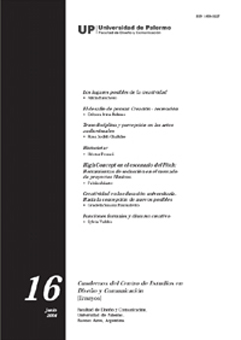El desafío de pensar. Creación - recreación
Abstract
The work try to broad the thematic of creativity starting from the theoretical emptiness- and also opportunity- generated due to the lost of security, stability and strengthen that the modern paradigm gave for the
building of theories that would aloud to apprehend reality. Analysis some lines which nowadays have
been presented as the notion of time and space which have been bent, while complexity and uncertainty
have infiltrated. These perspectives we can think which opportunities are enabled these days. What
happens with the construction of knowledge if the subject is another? Space has changed. The world has
globalise but the individual finds itself even more isolated. The problematic raises when we assist creation/
recreation as only repetition, reproduction on the construction itself, or the creation and recreation as an
opportunity of the same complexity, from its difference, allowing us
References
Augé, M. (1992): Los “no lugares”. Barcelona: Gedisa, 1994.
Bauman, Z. (2001): Comunidad. Buenos Aires: Siglo Veintiuno, 2003.
Bauman, Z. (2000): Modernidad Líquida. Buenos Aires: Fondo de Cultura Económica, 2003.
Churba, C. (1995): La Creatividad. Buenos Aires: Dunken, 1995.
Díaz, E. (1999): Posmodernidad. Buenos Aires: Biblos, 1999.
Eagleton, T. (1998): Las ilusiones del posmodernismo. Buenos Aires: Paidos, 1998.
Foucault, M. (1975. Vigilar y castigar. México: Siglo Veintiuno, 1995.
Freud, S. (1907), El Creador literario y el fantaseo. OCT IX. Buenos Aires:Amorrortu. 1993.
Giddens, A. (1992). La transformación de la intimidad. Madrid: Cátedra, 1995.
Guerrero, A. (1988). Curso de Creatividad. Buenos Aires: El Ateneo,1992.
Jameson, F. (1991. Ensayos sobre el posmodernismo. Buenos Aires: Imago Mundi,1991.
Belmes, Débora Irina El desafío de pensar. Creación - recreación
Le Breton, D. (1990). Antropología del cuerpo y modernidad. Buenos Aires: Nueva Visión,1995.
Lipovetsky, G. (1983). La era del vacío. Barcelona: Anagrama, 1996.
Morin, E. (1991). Cultura y Conocimiento. En el Ojo del Observador. Barcelona: Gedisa, 1994.
Schnitman, Nuevos paradigmas, cultura y subjetividad. Buenos Aires: Paidos, 1994.
Prigogine, I. (1994). De los relojes a las nubes. En Schnitman, Nuevos paradigmas, cultura y subjetividad. Buenos Aires: Paidos, 1994.
Prigogine, I. (1994). ¿El fin de la ciencia? En Schnitman, Nuevos Paradigmas, cultura y subjetividad. Buenos Aires: Paidos, 1994.
Roa, A. (1995):.Modernidad y Posmodernidad. Chile: Andrés Bello, 1995.
Romo, M. (1997). Psicología de la creatividad. Barcelona: Paidos Ibérica, 1997.
Sarlo, B. (2001). Tiempo presente. Buenos Aires: Siglo Veintiuno, 2001.
Scnitman, D. (1994). Nuevos Paradigmas, Cultura y Subjetividad. Buenos Aires: Paidos. 2002.
Vattimo G. y otros (1990). En torno a la posmodernidad. Barcelona: Anthropos, 1994.
Watzlawick P. y Krieg P., comps (1991). El Ojo del observador. Barcelona: Gedisa, 1994.
Winnicott, D (1971). Realidad y Juego. Barcelona: Gedisa, 2000.
Los autores/as que publiquen en esta revista ceden los derechos de autor y de publicación a "Cuadernos del Centro de Estudios de Diseño y Comunicación", Aceptando el registro de su trabajo bajo una licencia de atribución de Creative Commons, que permite a terceros utilizar lo publicado siempre que de el crédito pertinente a los autores y a esta revista.


